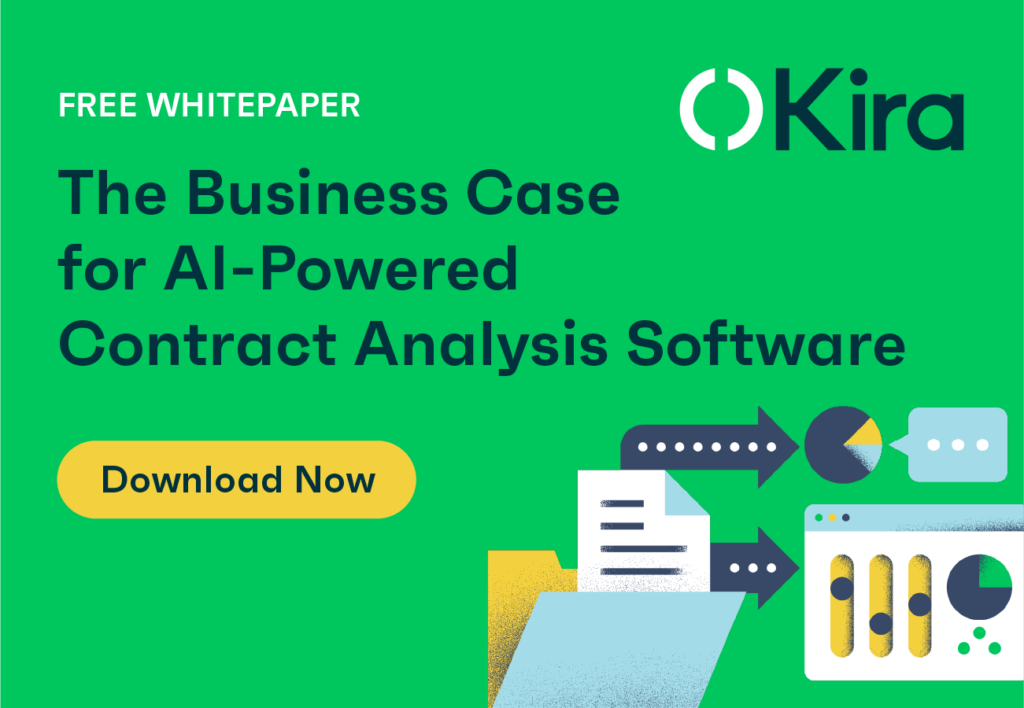
Introducing a new downloadable whitepaper by Kira Systems
In 2018, Thomson Reuters surveyed more than 400 corporate counsel and senior administrators on their efforts to improve efficiency and increase productivity across their teams.
Twenty-five percent of survey respondents had decreased their spending on outside counsel over the past two years, and 20% had increased the use of secondments — arrangements whereby attorneys are temporarily reassigned to a client’s legal department — up from 7% in 2016.
Furthermore, 43% planned to increase the use of contract attorneys (presumably to handle ever-increasing workloads) — while 29% (up from 21% in 2016) had hired a legal operations manager.
This ever-growing emphasis on efficiency has motivated lawyers to turn to sophisticated artificial intelligence (AI) tools to reduce duplicative work and shave hours off the time they must devote to manual contract review. But how receptive is your executive team in adopting AI solutions? After all, communicating the anticipated ROI can be challenging, to say the least. Fortunately, our latest whitepaper, The Business Case for AI-Powered Contract Analysis Software, is a deep dive into how making the business case can easily be done by presenting quantifiable outcomes.
Getting executive buy-in
Anyone experienced in sales knows that a multi-threaded approach works best. While it may only take one signature to sign off on a deal, the decision rarely lies with just one person, but rather, an entire team. The same can be said for getting leadership to buy-in on an internal investment.
However, with corporate counsel in a constant battle to balance business objectives with the responsibility to mitigate risk within their organization, articulating the need for innovative investments to them can be challenging. That’s why a business case is needed – to provide a rationale and demonstrate how the business – and all the teams within it – will be affected.
…with corporate counsel in a constant battle to balance business objectives with the responsibility to mitigate risk within their organization, articulating the need for innovative investments to them can be challenging.
Ultimately, being able to effectively communicate how your company’s technological roadmap would benefit from an investment in AI (not to mention the impact on teams, processes, and overall quality of work) is key.
Why AI?
In the Thomson Reuters report, ‘Ready or Not: Artificial Intelligence and Corporate Legal Departments’, corporate counsel were said to, ‘believe they are tech-savvy, but acknowledge that their comfort level and confidence with technology have limitations, specifically around artificial intelligence’.
However, as the impact of AI continues to grow, its effects are sure to spill over into the legal profession well into the next decade. Already, Legal AI is said to be ‘slowly transforming the profession and closing in on the work of paralegals, legal researchers, and litigators’.
This leaves legal firms at a crossroads; future-proof their business and adapt as the fourth industrial revolution continues to shape and re-shape industries at large. Or, risk not being able to keep up with the changing needs and expectations of their clients (and associates).
Law firms are already using AI to more efficiently perform due diligence, conduct research and bill hours. In fact, The American Bar Association’s 2018 Legal Technology Survey Report found that only 10% of lawyers say their firms currently use AI-based tools, but 36% think artificial intelligence tools will become mainstream in the legal profession in the next three to five years.

Using data to help justify an investment in AI
In an increasingly technology-driven landscape, data has become the arbiter of truth. Impactful, real statistics are found to be the most persuasive in making a business case for employing AI tools. So, when making the case for something like AI-powered contract analysis software, being able to say, ‘[…] Independent research demonstrates that Kira’s machine learning software can save 50% – 80% of associate-level attorneys’ time,’ is invaluable.
Independent research demonstrates that Kira’s machine learning software can save 50% – 80% of associate-level attorneys’ time.
Our latest whitepaper arms you with important data by covering pain points that, while not unique, can be commonly found within legal firms, such as:
- Reliance on outside counsel
- Associate turnover and dissatisfaction
- Risk Management
- Low efficiency
Future-proof your business
While only you will know what’s best for your business in the end, it helps to understand how AI-powered contract analysis tools like Kira can help achieve your company goals.
And, while we understand that articulating the value of innovative investments like AI-powered tools can be challenging, by downloading our whitepaper, you can start making your case today!

[ Artificial Lawyer is proud to bring you this sponsored article by Kira Systems. ]